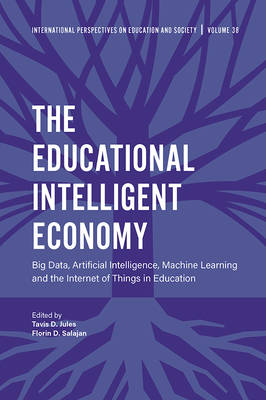
- Afhalen na 1 uur in een winkel met voorraad
- Gratis thuislevering in België vanaf € 30
- Ruim aanbod met 7 miljoen producten
- Afhalen na 1 uur in een winkel met voorraad
- Gratis thuislevering in België vanaf € 30
- Ruim aanbod met 7 miljoen producten
Zoeken
The Educational Intelligent Economy
Big Data, Artificial Intelligence, Machine Learning and the Internet of Things in Education
€ 180,45
+ 360 punten
Omschrijving
Access to big data, the "new commodity" for the 21st century economies, and its uses and potential abuses, has both conceptual and methodological impacts for the field of comparative and international education. This book examines, from a comparative perspective, the impact of the movement from the so-called knowledge-based economy towards the Intelligent Economy, which is premised upon the application of knowledge. Knowledge, the central component of the knowledge-based economy, is becoming less important in an era that is projected to be dominated and defined by the integration of complex technologies under the banner of the fourth industrial revolution. In this new era that blends the physical with the cyber-physical, the rise of education intelligence means that clients including countries, organizations, and other stakeholders are equipped with cutting-edge data in the form of predicative analytics, and knowledge about global educational predictions of future outcomes and trends. In this sense, this timely volume links the advent of this new technological revolution to the world of governance and policy formulation in education in order to open a broader discussion about the systemic and human implications for education of the emerging intelligent economy. By providing a unique comparative perspective on the Educational Intelligent economy, this book will prove invaluable for researchers and scholars in the areas of comparative education, artificial intelligence and educational policy.
Specificaties
Betrokkenen
- Uitgeverij:
Inhoud
- Aantal bladzijden:
- 304
- Taal:
- Engels
- Reeks:
- Reeksnummer:
- nr. 38
Eigenschappen
- Productcode (EAN):
- 9781787548534
- Verschijningsdatum:
- 25/11/2019
- Uitvoering:
- Hardcover
- Formaat:
- Genaaid
- Afmetingen:
- 157 mm x 226 mm
- Gewicht:
- 539 g

Alleen bij Standaard Boekhandel
+ 360 punten op je klantenkaart van Standaard Boekhandel
Beoordelingen
We publiceren alleen reviews die voldoen aan de voorwaarden voor reviews. Bekijk onze voorwaarden voor reviews.






